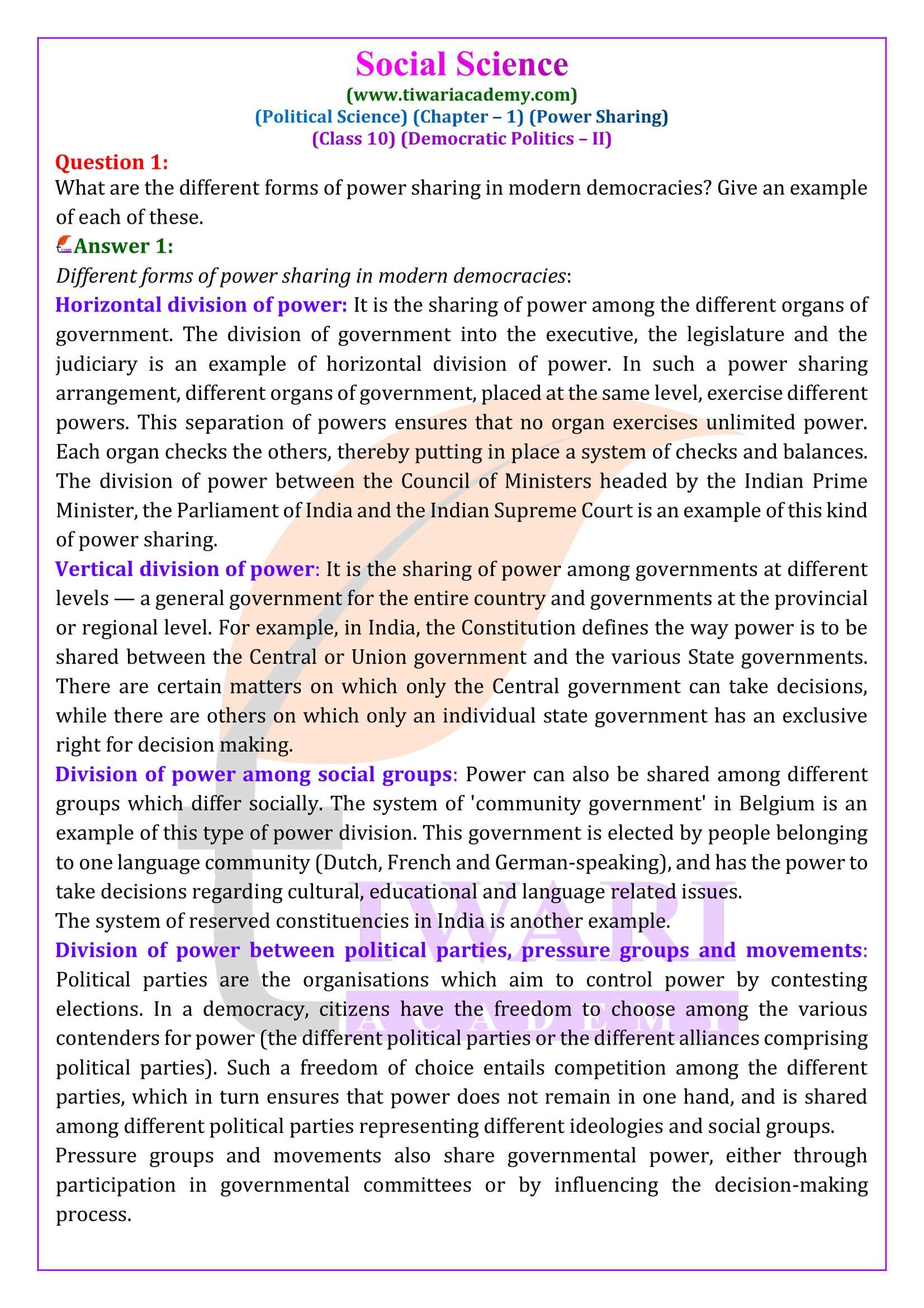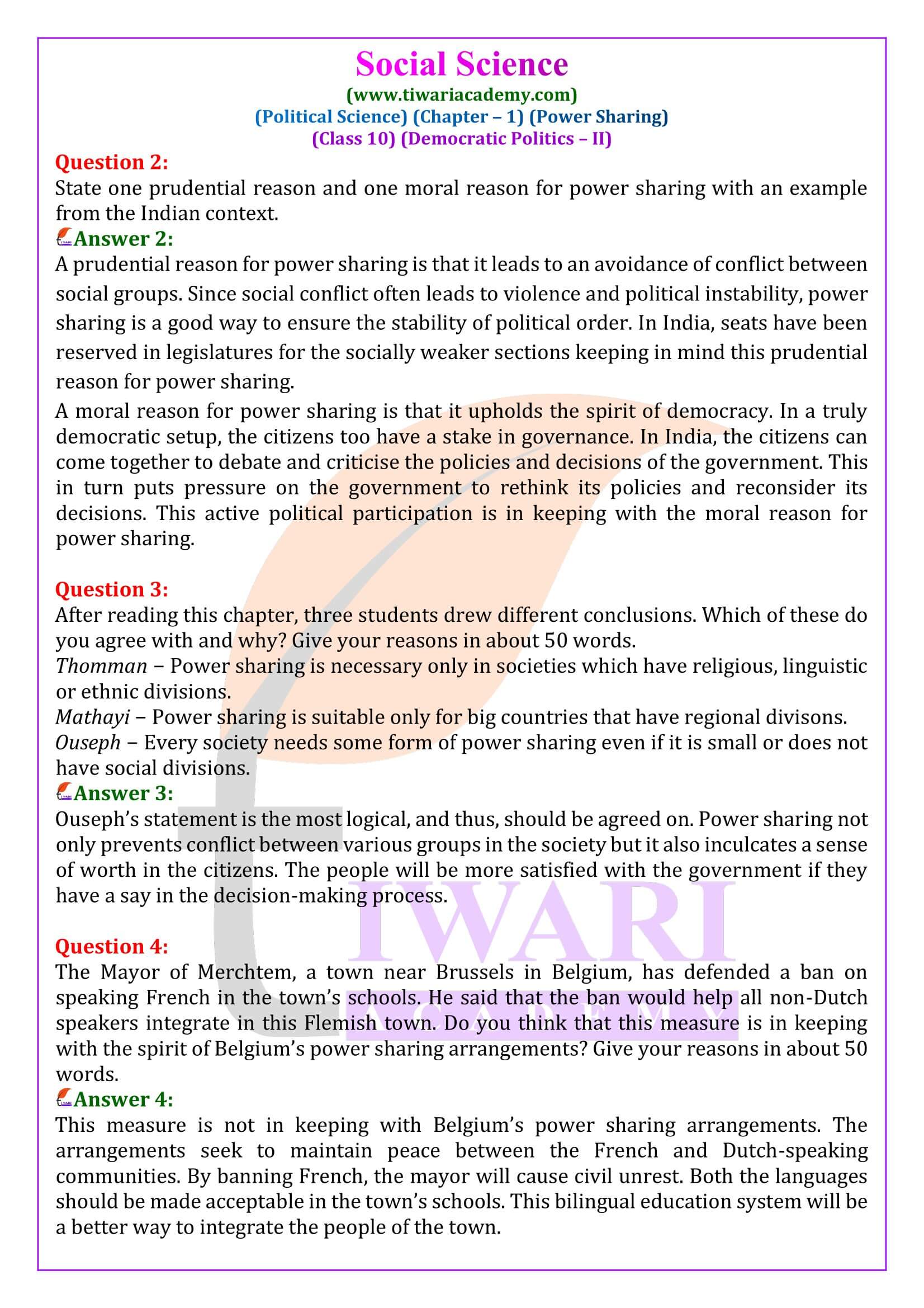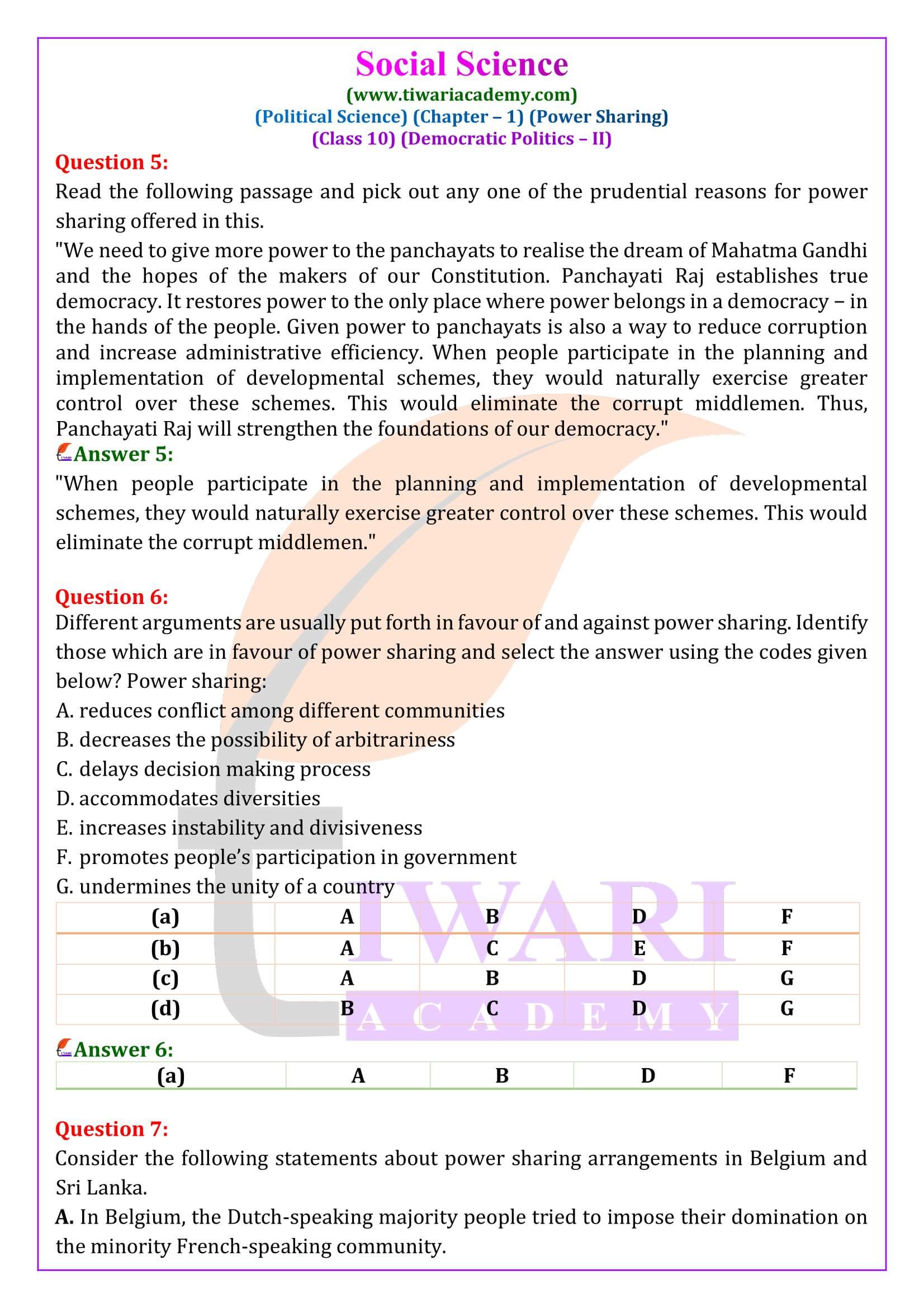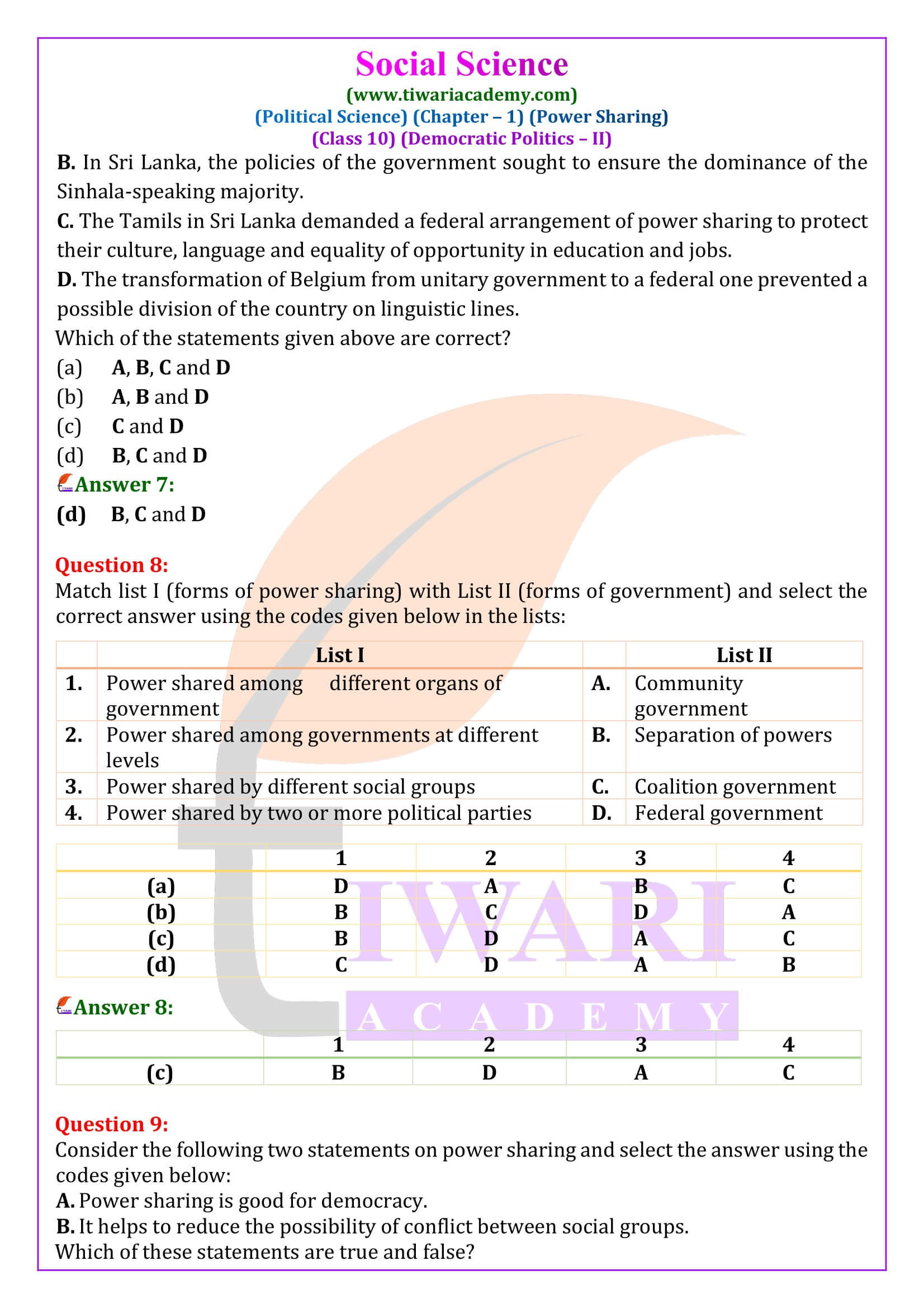NCERT Solutions for Class 10 Political Science Chapter 1 Power Sharing in English and Hindi Medium updated for current academic session 2025-26. The question answers of 10th Political Science chapter 1 is modified and revised as per the new NCERT textbooks published for 2025-26 exams.
NCERT Solutions for Class 10 Civics Chapter 1
NCERT Solutions for Class 10 Civics Chapter 1
| Class: | 10 |
| Subject: | Social Science – Civics |
| Chapter 1: | Power Sharing |
| Academic Session: | 2025-26 |
NCERT Solutions for Class 10 Civics Chapter 1 PDF
NCERT Solutions for Class 10 Civics Chapter 1 (Political Science) in PDF form free to download updated for new academic session 2025-26. Download Apps for Android as well as IOS for online and Offline use based on latest NCERT Textbooks and new CBSE Syllabus.
Exatra Questions Class 10 Civics Chapter 1
Why was the minority French speaking community relatively rich and powerful?
In Brussels, the capital of Belgium, the French speaking people are in majority. The power has been into the hands of French people for a longer period and benefitted them for economic development and education. The French speaking population was better read, more qualified and had access to more resources than the native Dutch population. The French were part of an aristocracy of trades man and thus were financially strong.
Pressure groups and interest groups share power with the government indirectly.
(i) Interest groups such as those of trader’s businessman industrialist’s farmers and industrial workers have a direct share in government power through participation in government committees.
(ii) They also bring influence on the decision making process of the govt.
What do we learn from the two stories of Belgium and Sri Lanka?
We learnt following things from the example of Belgium and Sri Lanka:
(i) In Belgium the leaders realized that the unity of the country is possible only by respecting the interests of different communities and religious.
(ii) Such a realisation resulted in mutually acceptable arrangements for sharing power. It helped to avoid civic strife between two communities and a possible division of the country.
(iii) Sri Lankan example shows us that if a majority community wants to force it dominance over others and refused to share power, it can undermine the unity of the country.
The Basic Principles of Power Sharing
The basic principles of power sharing are:
(i) Government of different political parties i.e. a coalition Government.
(ii) Protection of minority rights.
(iii) Decentralisation of power.
(iv) To avoid conflicts
One Mark Questions with Answers
1. Give an example of power shared among different social groups?
2. Which community in Belgium is relatively rich and powerful?
3. Which language is spoken by 80 of people in Brussels?
4. Which religion is followed by majority of Sinhala speaking people?
5. Which two main languages are spoken in Belgium?
6. Name any two countries with which Belgium share borders.
7. How many amendments have been made in the constitution of Belgium between 1970 and 1993?
8. Which is the official religion of Sri Lanka?
9. What is the main reason for the killing of thousands of Sri Lanka people and loss of their live hoods?
10. Which language is spoken by the people of Wallonia region of Belgium?
Answers of 1 Mark Questions
1. The community govt. of Belgium
2. French Speaking
3. French
4. Buddhism
5. Dutch and French
6. France and Luxem
7. Four
8. Buddism
9. Civil war
10. French
Important Questions on Class 10 Civics Chapter 1
The Mayor of Merchtem, a town near Brussels in Belgium, has defended a ban on speaking French in the town’s schools. He said that the ban would help all non-Dutch speakers integrate in this Flemish town. Do you think that this measure is in keeping with the spirit of Belgium’s power sharing arrangements? Give your reasons in about 50 words.
This measure is not in keeping with Belgium’s power sharing arrangements. The arrangements seek to maintain peace between the French and Dutch-speaking communities. By banning French, the mayor will cause civil unrest. Both the languages should be made acceptable in the town’s schools. This bilingual education system will be a better way to integrate the people of the town.
State one prudential reason and one moral reason for power sharing with an example from the Indian context.
A prudential reason for power sharing is that it leads to an avoidance of conflict between social groups. Since social conflict often leads to violence and political instability, power sharing is a good way to ensure the stability of political order. In India, seats have been reserved in legislatures for the socially weaker sections keeping in mind this prudential reason for power sharing. A moral reason for power sharing is that it upholds the spirit of democracy. In a truly democratic setup, the citizens too have a stake in governance. In India, the citizens can come together to debate and criticise the policies and decisions of the government. This in turn puts pressure on the government to rethink its policies and reconsider its decisions. This active political participation is in keeping with the moral reason for power sharing.
What are the different forms of power sharing in modern democracies? Give an example of each of these.
Different forms of power sharing in modern democracies: Horizontal division of power: It is the sharing of power among the different organs of government. The division of government into the executive, the legislature and the judiciary is an example of horizontal division of power. In such a power sharing arrangement, different organs of government, placed at the same level, exercise different powers. This separation of powers ensures that no organ exercises unlimited power. Each organ checks the others, thereby putting in place a system of checks and balances. The division of power between the Council of Ministers headed by the Indian Prime Minister, the Parliament of India and the Indian Supreme Court is an example of this kind of power sharing. Vertical division of power: It is the sharing of power among governments at different levels — a general government for the entire country and governments at the provincial or regional level. For example, in India, the Constitution defines the way power is to be shared between the Central or Union government and the various State governments. There are certain matters on which only the Central government can take decisions, while there are others on which only an individual state government has an exclusive right for decision making. Division of power among social groups: Power can also be shared among different groups which differ socially. The system of ‘community government’ in Belgium is an example of this type of power division. This government is elected by people belonging to one language community (Dutch, French and German-speaking), and has the power to take decisions regarding cultural, educational and language related issues. The system of reserved constituencies in India is another example. Division of power between political parties, pressure groups and movements: Political parties are the organisations which aim to control power by contesting elections. In a democracy, citizens have the freedom to choose among the various contenders for power (the different political parties or the different alliances comprising political parties). Such a freedom of choice entails competition among the different parties, which in turn ensures that power does not remain in one hand, and is shared among different political parties representing different ideologies and social groups. Pressure groups and movements also share governmental power, either through participation in governmental committees or by influencing the decision-making process.
Why is power sharing desirable? Explain a three forms of powers sharing in modern democracies with example.
To reduce the possibility of conflicts between different social groups and ensure political stability power sharing is desirable. Different forms of power sharing are as under. Horizontal distribution of power is shared among different organs of government such as Executive, Legislature and Judiciary. Vertical distribution of power. Power can be shared among governments at different levels such as central Govt; state Govt. and Local Govt. Power may also be shared among different social groups. Ex. Religious and linguistic groups, community government in Belgium etc. Power sharing arrangements can also be seen in the way political parties, pressure groups and movements control or influence those in power.








